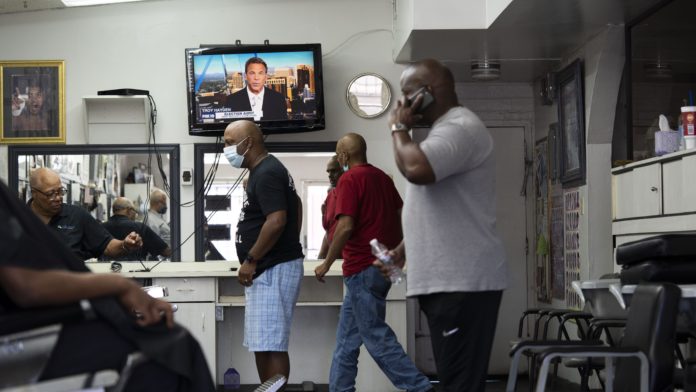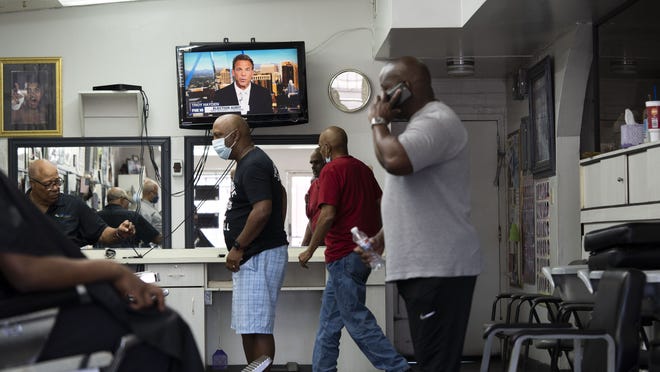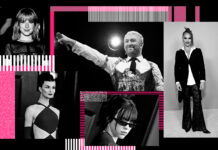Naimah Nuriddin was looking at her cellphone while her 10-year-old son, Rahiem, sat in a barber’s chair getting a haircut.
Her 5-year-old daughter, Khaliayah, sat next to her in one of the black vinyl chairs lined up against one wall inside Natural Impressions. The barbershop on East Washington Street near downtown Phoenix caters to Black people, who sometimes drive more than 100 miles from as far as Prescott for a trim.
One customer once described Natural Impressions as “the poor man’s country club” where people come to talk politics, church, movies, sports — you name it — not just for a haircut.
This week, there was one topic on everyone’s mind: The verdict of Derek Chauvin, a former Minneapolis police officer charged with murdering George Floyd.
A jury of 12 people found Chauvin guilty of all three charges against him: second-degree unintentional murder, third-degree murder and second-degree manslaughter.
“I was actually relieved and surprised,” said Nuriddin, a schoolteacher, looking up from her cellphone. “My opinion, honestly, was that everything that happened was deserved. Finally, for once, somebody has got justice for losing a loved one to the law enforcement system.”
Nuriddin said the verdict had left her in disbelief, in large part due to her own experience with a police killing. In December 2014, her cousin, 34-year-old Rumain Brisbon, was killed by a Phoenix police officer, Mark Rine.
The shooting of an unarmed Black man by a white police officer sparked weeks of protests in Phoenix in the wake of other high-profile killings by police across the country, including the death of Michael Brown in Ferguson, Missouri in August 2014. Nuriddin said she participated in the protests.
Rine claimed he thought Brisbon’s hand was gripping a gun when he opened fire. Brisbon tried to run away following a confrontation and struggle with Rine when he was shot twice, including once in the back, at close range. The object Brisbon turned out to be holding was a pill bottle.
Brisbon was shot in front of his 18-month-old daughter, Nuriddin said.
Despite the protests, former Maricopa County Attorney Bill Montgomery later chose not to file charges against Rine.
“No justice was served,” Nuriddin said, which was why she was not expecting Chauvin to be found guilty.
Relief, surprise about the verdict
Many of the customers who discussed the verdict at the barbershop on Friday, among them a retired cop, a tech company professional and a retired state lawmaker, shared Nuriddin’s relief and surprise that a jury had found Chauvin guilty.
Relief that justice had prevailed, and that months of tensions and turmoil leading up to the verdict had been replaced with a sense of calm. But also disbelief. With history as a guide, almost every person at the barbershop said they had been bracing for a different verdict. A not guilty verdict, they said would most certainly have triggered a spasm of outrage, justifiably so, but which they also feared might devolve into violence.
“Let me put it this way, if the verdict would have been the opposite, I believe this week would have just been tragic,” said Britton Knox, owner of the barbershop. “I believe there would have been a lot more activity, a lot more conversation, a lot more destruction, a lot more killings.”

Many at the barbershop felt that the guilty verdict boiled down to two key factors: The cellphone video of Floyd’s death and the Black Lives Matter protests.
The cellphone video of Chauvin kneeling on the neck of Floyd for 9 minutes and 29 seconds had shown that the cellphone has become the most effective tool in the quest for racial justice.
“I believe this is where the real change is coming from. The technology,” said Knox, holding up his cellphone.
“All these years this has been occurring. But in this particular case there was a record,” Knox said in between haircuts.
He shuddered to think about how many other examples of police brutality have gone unrecorded. “That’s what’s terrifying,” he said.
In addition to the cellphone video, others at the barbershop said the wave of Black Lives Matter protests that swept through cities across the country, and the globe, after Floyd’s death also had played a key role in the guilty verdict.
The way white people, Black people, brown people, straight people, gay people, young people, old people had joined together had forced the jury not to turn away from the evidence, as other juries had done in the past, they said.
Those at the barbershop also rejected the notion made by some media pundits that the jury was intimidated into making a guilty verdict out of fear of triggering more protests and possibly more violence.
“That’s B.S. He was guilty because he was guilty,” said Leroy Dean, 57, the retired tech company worker, sitting in a barber’s chair.
‘Millions of voices’ calling for justice
In a separate interview, Rashad Shabazz, a professor who studies race and social justice issues at Arizona State University’s School of Social Transformation, agreed that without the Black Lives Matter protests, Chauvin never would have been found guilty.
“Without those millions of voices, there is a significant potential that Chauvin would have been acquitted or it would have ended in a hung jury,” Shabazz said.
Shabazz also called it a “sad commentary” that without the video, the case of Floyd’s death most likely never would have even gone to trial.
“In that respect, it is a sad commentary on the inability of white Americans to listen to people of color,” Shabazz said. “There is just an inability of white people to really hear us when we say we have been wronged and that we have been mistreated and that we are suffering. And that inability to have compassion and empathy is a real reflection of the dangers of racism and white supremacy.”
‘Full accountability for everyone’: Legal community applauds verdict in Chauvin trial
At the barbershop on Friday, the sense of relief and surprise over the guilty verdict was tempered by anxiety over the upcoming sentencing on June 12.
Chauvin faces a maximum sentence of 40 years in prison. But several people at the barbershop said they fear Chauvin will receive a lighter sentence.
“I’m hoping he does get the maximum. He took someone’s life. He should have to pay for that,” Nuriddin said.
But she is expecting a “slap on the wrist.”
“A slap on the wrist. Everyone that I associate with, and co-workers, we all talked about it. We believe he is” going to get a slap on the wrist, Nuriddin said.
A closer look at civil rights abuses
Bobby Jones, 48, leaned back in the barber’s chair as Knox trimmed his beard.
As a former law enforcement officer, Jones said he had something to say about the Chauvin guilty verdicts.
“What else you are seeing that is surprising is that the Justice Department is coming in and investigating police departments,” Jones said. “That’s never happened before.”

He was referring to the Justice Department’s announcement the day after the Chauvin verdicts that it will conduct a broad inquiry into the Minneapolis Police Department’s operations, including use of excessive force, discriminatory actions involving those with mental health problems, department training policies and supervision.
The inquiry showed that the Biden administration plans to use federal law enforcement to more aggressively pursue police departments accused of civil rights abuses.
As a 20-year police officer in Florida, Jones said he was glad Chauvin had been found guilty.
Opinion: Will Black people trust the system now that Chauvin has been found guilty?
“From every aspect of the law, it was wrong what he did,” Jones said.
Jones, who was deputy chief of police of the Cocoa Police Department when he retired, said the action by the federal government was long overdue.
“I think it’s amazing,” Jones said. “Now you got somebody who is policing the police. There has been a culture where everyone just believes exactly what the police said.”
“Everything you are seeing now (in terms of police abuse) has been going on forever,” Jones said. “That is why African Americans are so fed up because it’s been going on for so long and there was nothing we could do about it. Now there is something we can do about it because of these cameras and these phones.”

Jones said, “No police officer — I don’t care, Black, white, purple — is going to agree with what Chauvin did.”
What’s scary, he said, is that the other officers didn’t stop him.
“That’s the culture that needs to change,” Jones said. “When officers see other officers doing something wrong, they need to stop it.”
Jones said part of the problem is good cops are afraid to turn in bad cops because law enforcement is a dangerous job and police rely on each other when they are in a tight spot.
“The cop mentality has always been us against everybody else, right?” Jones said. “I need someone’s who is always going to be there to back my life up. And if you are mad at me, you might stop at a red light and I need you to go through that red light when I’m yelling for help.”
Art Hamilton: A chance for police reform
Later that afternoon, a man wearing a blue tracksuit walked into the barbershop. He gave Knox a fist bump before heading to the back of the shop and climbing into a barber’s chair.
It was 73-year-old Art Hamilton, a giant of Arizona politics, coming in for a haircut. Hamilton served in the Arizona legislature for nearly three decades in the 1970s, 1980s and 1990s, including as Democratic minority leader.

Hamilton said he worried that a different outcome in the Chauvin trial would have sparked not just turmoil but “that people would have been reaffirmed in the notion that justice is impossible in the killing of an African American by police. I think the loss of faith in the judicial system’s capacity for justice would have far more critical than just violence.”
He said the guilty verdicts had boosted his optimism that Congress will pass a police reform bill named in Floyd’s honor. The George Floyd Justice in Police Act passed the House in March. The bill is intended to bolster police accountability and prevent problem officers from moving from one department to another.
“I don’t believe (the verdict) is a panacea or somehow we’ve reached a watershed moment,” Hamilton said. “But I believe it may provide enough impetus to get the George Floyd bill passed. And that would be a plus.”
‘We do fear for our lives’
After Knox finished giving her son a haircut, Nuriddin looked up to give Rahiem a look.
“Oooh, that looks nice. Thank you,” Nuriddin said before Rahiem had a chance to pull on a baseball cap. “Don’t you know those girls be coming around ringing my doorbell today.”

Rahiem took a seat nearby and picked up his cellphone while Nuriddin continued talking. Speaking in a hushed tone, she confided that as an African American mother, she fears for the lives of her children.
“With all that is going on, women, men who are African American, we do fear for our lives,” she said. “I feel very very unsafe for my children, especially my son.”
She recalled an incident the previous Saturday when she took her children to play at Eastlake Park. She said she was shocked when a group of neo-Nazis showed up as they were leaving and began chanting, “Black Lives Don’t Matter.”
Nuriddin said she didn’t want to stick around. But as Nuriddin got into their car, she said one of the neo-Nazis looked at her son and said, “Your kid’s life don’t matter.”
Reach the reporter at daniel.gonzalez@arizonarepublic.com or at 602-444-8312. Follow him on Twitter @azdangonzalez.
Support local journalism. Subscribe to azcentral.com today.









